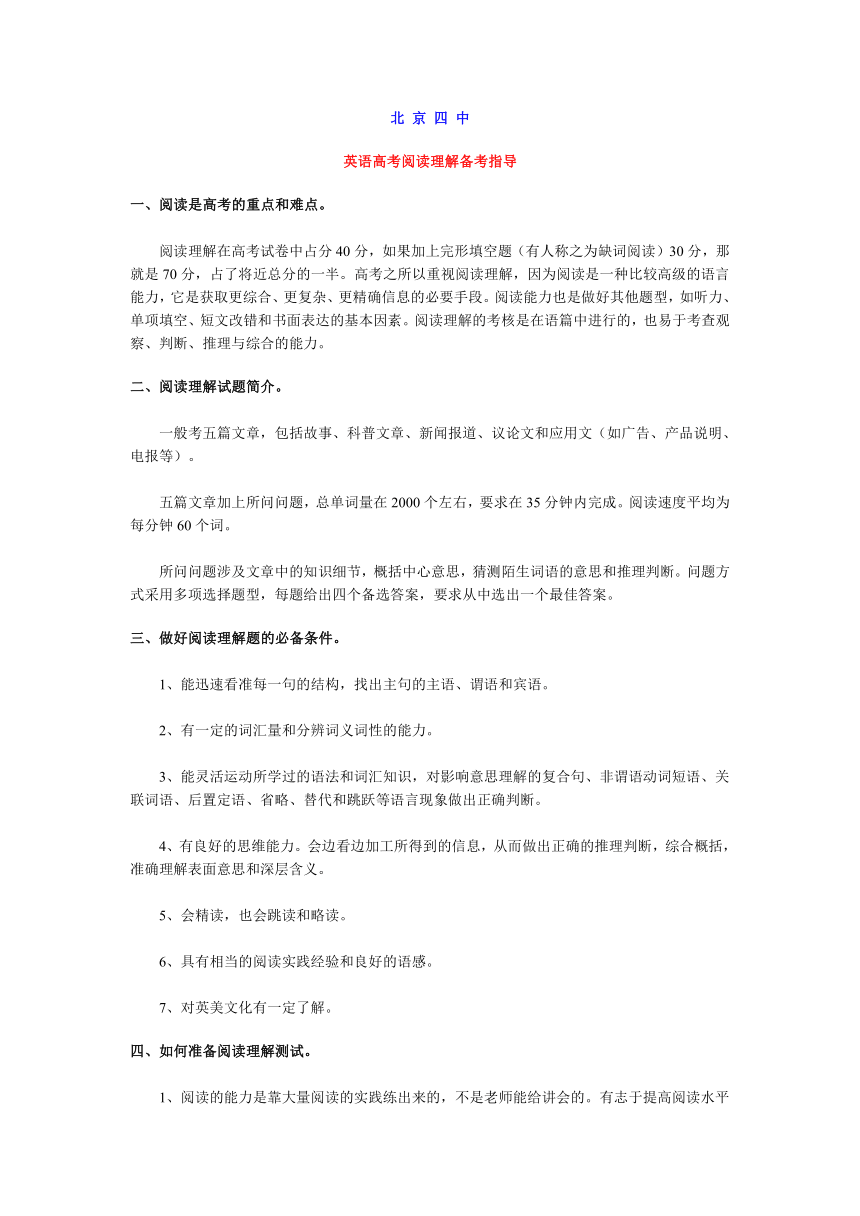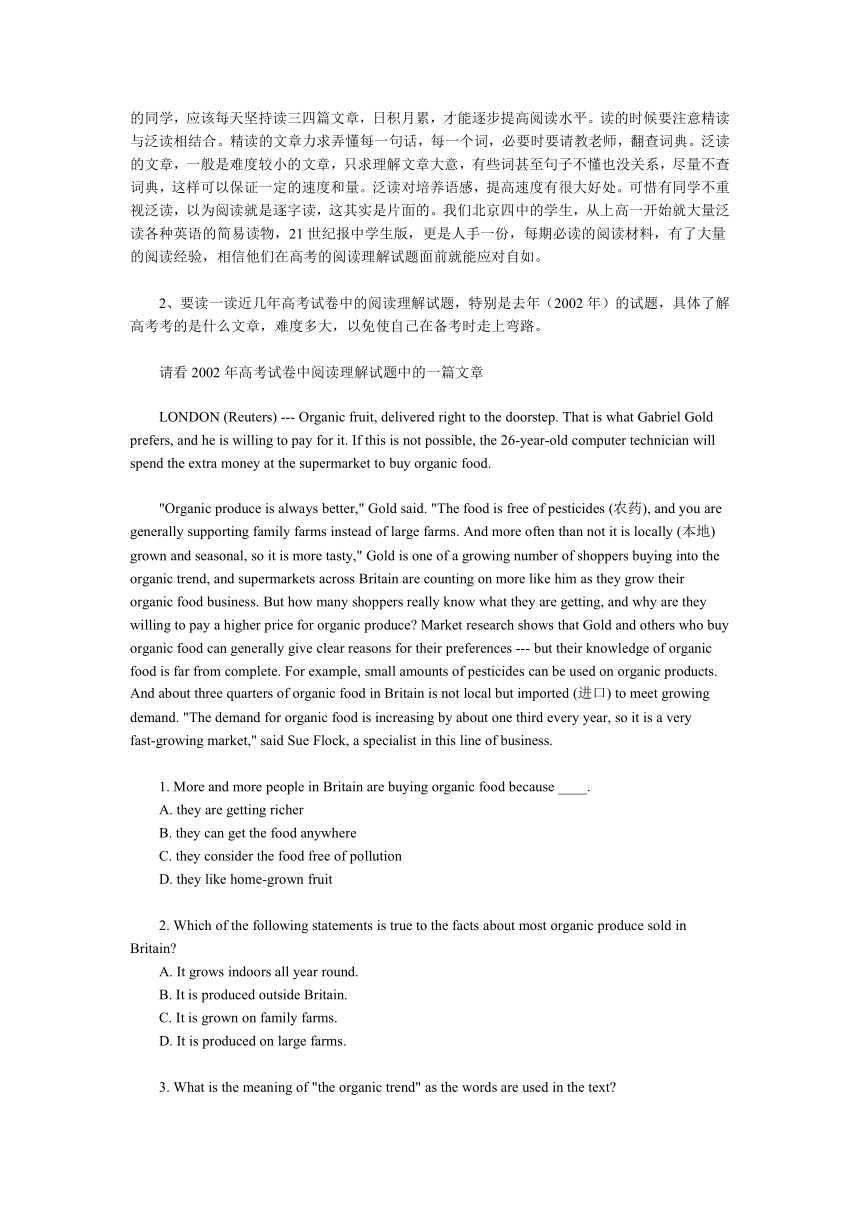阅读理解备考指导(1)[下学期]
图片预览


文档简介
北 京 四 中
英语高考阅读理解备考指导
一、阅读是高考的重点和难点。
阅读理解在高考试卷中占分40分,如果加上完形填空题(有人称之为缺词阅读)30分,那就是70分,占了将近总分的一半。高考之所以重视阅读理解,因为阅读是一种比较高级的语言能力,它是获取更综合、更复杂、更精确信息的必要手段。阅读能力也是做好其他题型,如听力、单项填空、短文改错和书面表达的基本因素。阅读理解的考核是在语篇中进行的,也易于考查观察、判断、推理与综合的能力。
二、阅读理解试题简介。
一般考五篇文章,包括故事、科普文章、新闻报道、议论文和应用文(如广告、产品说明、电报等)。
五篇文章加上所问问题,总单词量在2000个左右,要求在35分钟内完成。阅读速度平均为每分钟60个词。
所问问题涉及文章中的知识细节,概括中心意思,猜测陌生词语的意思和推理判断。问题方式采用多项选择题型,每题给出四个备选答案,要求从中选出一个最佳答案。
三、做好阅读理解题的必备条件。
1、能迅速看准每一句的结构,找出主句的主语、谓语和宾语。
2、有一定的词汇量和分辨词义词性的能力。
3、能灵活运动所学过的语法和词汇知识,对影响意思理解的复合句、非谓语动词短语、关联词语、后置定语、省略、替代和跳跃等语言现象做出正确判断。
4、有良好的思维能力。会边看边加工所得到的信息,从而做出正确的推理判断,综合概括,准确理解表面意思和深层含义。
5、会精读,也会跳读和略读。
6、具有相当的阅读实践经验和良好的语感。
7、对英美文化有一定了解。
四、如何准备阅读理解测试。
1、阅读的能力是靠大量阅读的实践练出来的,不是老师能给讲会的。有志于提高阅读水平的同学,应该每天坚持读三四篇文章,日积月累,才能逐步提高阅读水平。读的时候要注意精读与泛读相结合。精读的文章力求弄懂每一句话,每一个词,必要时要请教老师,翻查词典。泛读的文章,一般是难度较小的文章,只求理解文章大意,有些词甚至句子不懂也没关系,尽量不查词典,这样可以保证一定的速度和量。泛读对培养语感,提高速度有很大好处。可惜有同学不重视泛读,以为阅读就是逐字读,这其实是片面的。我们北京四中的学生,从上高一开始就大量泛读各种英语的简易读物,21世纪报中学生版,更是人手一份,每期必读的阅读材料,有了大量的阅读经验,相信他们在高考的阅读理解试题面前就能应对自如。
2、要读一读近几年高考试卷中的阅读理解试题,特别是去年(2002年)的试题,具体了解高考考的是什么文章,难度多大,以免使自己在备考时走上弯路。
请看2002年高考试卷中阅读理解试题中的一篇文章
LONDON (Reuters) --- Organic fruit, delivered right to the doorstep. That is what Gabriel Gold prefers, and he is willing to pay for it. If this is not possible, the 26-year-old computer technician will spend the extra money at the supermarket to buy organic food.
"Organic produce is always better," Gold said. "The food is free of pesticides (农药), and you are generally supporting family farms instead of large farms. And more often than not it is locally (本地) grown and seasonal, so it is more tasty," Gold is one of a growing number of shoppers buying into the organic trend, and supermarkets across Britain are counting on more like him as they grow their organic food business. But how many shoppers really know what they are getting, and why are they willing to pay a higher price for organic produce Market research shows that Gold and others who buy organic food can generally give clear reasons for their preferences --- but their knowledge of organic food is far from complete. For example, small amounts of pesticides can be used on organic products. And about three quarters of organic food in Britain is not local but imported (进口) to meet growing demand. "The demand for organic food is increasing by about one third every year, so it is a very fast-growing market," said Sue Flock, a specialist in this line of business.
1. More and more people in Britain are buying organic food because ____.
A. they are getting richer
B. they can get the food anywhere
C. they consider the food free of pollution
D. they like home-grown fruit
2. Which of the following statements is true to the facts about most organic produce sold in Britain
A. It grows indoors all year round.
B. It is produced outside Britain.
C. It is grown on family farms.
D. It is produced on large farms.
3. What is the meaning of "the organic trend" as the words are used in the text
A. growing interest in organic food
B. better quality of organic food
C. rising market for organic food
D. higher prices of organic food
4. What is the best title for this news story
A. Organic food --- healthy, or just for the wealthy
B. The making of organic food in Britain
C. Organic food --- to import or not
D. Good qualities of organic food
这是一篇news story,选自新闻媒体。内容讲的是英国人现在喜欢有机食物,不是什么深奥的的科学原理。语言上的难度相当于高中课本第三册的文章。所问的四个问题,第一题,答案C。从第二段前三行可看出有机食物的好处,主要是没上农药,没有污染。第二题答案是B,此题考查哪个陈述是符合原文的。因为原题干中说的是most organic produce,全文倒数第四行说了四分之三靠进口,也就是说外国生产的,而那三个答案都不准确。第三题答案是A,此题考查对词性词义的判断,trend是倾向之意,表示大家日益增长的兴趣。第四题答案是A,此题考查的是概括文章中心意思。使用排除法答题比较合适,B、C、D三个答案显然只反映了文章的个别意思,都不对。
3、在准备阅读理解测试时,要对经常出现的问题进行总结。高考中的阅读理解问题,重点的有以下一些。
阅读重点题汇编
(1)考查主要思想或段落大意
1. The story mainly tells us ________.
2. From the passage we know that ________.
3. The writer wants to tell us ________.
4. The best title of this passage should be ________.
5. The main idea of Paragraph 1 is ________.
6. Paragraph 2 deals with ________.
7. The last paragraph ends the passage with an emphasis on ________.
8. What is the subject discussed in the text
9. Whish of the following statements is best supported by the last paragraph
(2)推理判断测试题
1. We can infer from the passage ________.
2. From the passage, we can tell ________.
3. We can conclude from the passage ________.
4. What probably happened in the end
5. When he said, "…", he meant ________.
6. This passage would most likely to be found in ________.
(3)考查文章细节理解的测试题
1. The right order which tells the story is ________.
2. Choose the right order of the events given in the following.
3. Which of the following maps shows the right position of ….
4. Which statement is true
(4)考查理解作者写作意图的测试题
1. This article is particularly written for ________.
2. When the writer says … he really means ________.
3. The author's attitude to… is that ________.
4. What kind of atmosphere(气氛)does the writer want to create in this passage
5. The writer regards… as ________.
6. The writer's purpose in writing this story is ________.
(5)猜测词义,常见的题干有
1. The word… in paragraph… refers to ________.
2. The underlined word "…" means ________.
3. The word "…" could be replaced by ________.
4. Which of the following words can take the place of …
4、应对阅读理解测试时的注意事项
1)如有的文章带标题,应仔细看标题。标题是文章主题的高度概括,它可以给我 们一些启示和线索。
2)先快速浏览一下全文。大概了解一下这是记叙文还是科普文章,中文注释的单词是什么意思。这一步要快。
3)仔细看原文,凡人物与数字或地名可用笔作个记号,没弄明白的地方也可划个线,以便看完全文再重读。读时要注意弄明白句子的主谓结构,同时在大脑中加工所得到的信息。
4) 看完文章,即可做题。要注意四个选项都看看,不要只看了一两个就作出判断。对有把握的题,在做完判断后就不要折回原文核对了。但对没有把握的题则应把相关的句或段重看一次。
5)判断词义词性时要注意结合上下文。人家考的是在特定的环境下的意思。
6)概括中心意思时,要注意不可离题太远,太笼统,但也不要只概括一段或几句的意思。
7)问及对某个问题的看法与态度,要记住是在问作者态度,而不是问你作为中国学生的想法。
8) 如时间够,还应复读全文,核对各题答案,完成未定之题。要注意各题的答案要逻辑一致,不能自相矛盾。
英语高考阅读理解备考指导
一、阅读是高考的重点和难点。
阅读理解在高考试卷中占分40分,如果加上完形填空题(有人称之为缺词阅读)30分,那就是70分,占了将近总分的一半。高考之所以重视阅读理解,因为阅读是一种比较高级的语言能力,它是获取更综合、更复杂、更精确信息的必要手段。阅读能力也是做好其他题型,如听力、单项填空、短文改错和书面表达的基本因素。阅读理解的考核是在语篇中进行的,也易于考查观察、判断、推理与综合的能力。
二、阅读理解试题简介。
一般考五篇文章,包括故事、科普文章、新闻报道、议论文和应用文(如广告、产品说明、电报等)。
五篇文章加上所问问题,总单词量在2000个左右,要求在35分钟内完成。阅读速度平均为每分钟60个词。
所问问题涉及文章中的知识细节,概括中心意思,猜测陌生词语的意思和推理判断。问题方式采用多项选择题型,每题给出四个备选答案,要求从中选出一个最佳答案。
三、做好阅读理解题的必备条件。
1、能迅速看准每一句的结构,找出主句的主语、谓语和宾语。
2、有一定的词汇量和分辨词义词性的能力。
3、能灵活运动所学过的语法和词汇知识,对影响意思理解的复合句、非谓语动词短语、关联词语、后置定语、省略、替代和跳跃等语言现象做出正确判断。
4、有良好的思维能力。会边看边加工所得到的信息,从而做出正确的推理判断,综合概括,准确理解表面意思和深层含义。
5、会精读,也会跳读和略读。
6、具有相当的阅读实践经验和良好的语感。
7、对英美文化有一定了解。
四、如何准备阅读理解测试。
1、阅读的能力是靠大量阅读的实践练出来的,不是老师能给讲会的。有志于提高阅读水平的同学,应该每天坚持读三四篇文章,日积月累,才能逐步提高阅读水平。读的时候要注意精读与泛读相结合。精读的文章力求弄懂每一句话,每一个词,必要时要请教老师,翻查词典。泛读的文章,一般是难度较小的文章,只求理解文章大意,有些词甚至句子不懂也没关系,尽量不查词典,这样可以保证一定的速度和量。泛读对培养语感,提高速度有很大好处。可惜有同学不重视泛读,以为阅读就是逐字读,这其实是片面的。我们北京四中的学生,从上高一开始就大量泛读各种英语的简易读物,21世纪报中学生版,更是人手一份,每期必读的阅读材料,有了大量的阅读经验,相信他们在高考的阅读理解试题面前就能应对自如。
2、要读一读近几年高考试卷中的阅读理解试题,特别是去年(2002年)的试题,具体了解高考考的是什么文章,难度多大,以免使自己在备考时走上弯路。
请看2002年高考试卷中阅读理解试题中的一篇文章
LONDON (Reuters) --- Organic fruit, delivered right to the doorstep. That is what Gabriel Gold prefers, and he is willing to pay for it. If this is not possible, the 26-year-old computer technician will spend the extra money at the supermarket to buy organic food.
"Organic produce is always better," Gold said. "The food is free of pesticides (农药), and you are generally supporting family farms instead of large farms. And more often than not it is locally (本地) grown and seasonal, so it is more tasty," Gold is one of a growing number of shoppers buying into the organic trend, and supermarkets across Britain are counting on more like him as they grow their organic food business. But how many shoppers really know what they are getting, and why are they willing to pay a higher price for organic produce Market research shows that Gold and others who buy organic food can generally give clear reasons for their preferences --- but their knowledge of organic food is far from complete. For example, small amounts of pesticides can be used on organic products. And about three quarters of organic food in Britain is not local but imported (进口) to meet growing demand. "The demand for organic food is increasing by about one third every year, so it is a very fast-growing market," said Sue Flock, a specialist in this line of business.
1. More and more people in Britain are buying organic food because ____.
A. they are getting richer
B. they can get the food anywhere
C. they consider the food free of pollution
D. they like home-grown fruit
2. Which of the following statements is true to the facts about most organic produce sold in Britain
A. It grows indoors all year round.
B. It is produced outside Britain.
C. It is grown on family farms.
D. It is produced on large farms.
3. What is the meaning of "the organic trend" as the words are used in the text
A. growing interest in organic food
B. better quality of organic food
C. rising market for organic food
D. higher prices of organic food
4. What is the best title for this news story
A. Organic food --- healthy, or just for the wealthy
B. The making of organic food in Britain
C. Organic food --- to import or not
D. Good qualities of organic food
这是一篇news story,选自新闻媒体。内容讲的是英国人现在喜欢有机食物,不是什么深奥的的科学原理。语言上的难度相当于高中课本第三册的文章。所问的四个问题,第一题,答案C。从第二段前三行可看出有机食物的好处,主要是没上农药,没有污染。第二题答案是B,此题考查哪个陈述是符合原文的。因为原题干中说的是most organic produce,全文倒数第四行说了四分之三靠进口,也就是说外国生产的,而那三个答案都不准确。第三题答案是A,此题考查对词性词义的判断,trend是倾向之意,表示大家日益增长的兴趣。第四题答案是A,此题考查的是概括文章中心意思。使用排除法答题比较合适,B、C、D三个答案显然只反映了文章的个别意思,都不对。
3、在准备阅读理解测试时,要对经常出现的问题进行总结。高考中的阅读理解问题,重点的有以下一些。
阅读重点题汇编
(1)考查主要思想或段落大意
1. The story mainly tells us ________.
2. From the passage we know that ________.
3. The writer wants to tell us ________.
4. The best title of this passage should be ________.
5. The main idea of Paragraph 1 is ________.
6. Paragraph 2 deals with ________.
7. The last paragraph ends the passage with an emphasis on ________.
8. What is the subject discussed in the text
9. Whish of the following statements is best supported by the last paragraph
(2)推理判断测试题
1. We can infer from the passage ________.
2. From the passage, we can tell ________.
3. We can conclude from the passage ________.
4. What probably happened in the end
5. When he said, "…", he meant ________.
6. This passage would most likely to be found in ________.
(3)考查文章细节理解的测试题
1. The right order which tells the story is ________.
2. Choose the right order of the events given in the following.
3. Which of the following maps shows the right position of ….
4. Which statement is true
(4)考查理解作者写作意图的测试题
1. This article is particularly written for ________.
2. When the writer says … he really means ________.
3. The author's attitude to… is that ________.
4. What kind of atmosphere(气氛)does the writer want to create in this passage
5. The writer regards… as ________.
6. The writer's purpose in writing this story is ________.
(5)猜测词义,常见的题干有
1. The word… in paragraph… refers to ________.
2. The underlined word "…" means ________.
3. The word "…" could be replaced by ________.
4. Which of the following words can take the place of …
4、应对阅读理解测试时的注意事项
1)如有的文章带标题,应仔细看标题。标题是文章主题的高度概括,它可以给我 们一些启示和线索。
2)先快速浏览一下全文。大概了解一下这是记叙文还是科普文章,中文注释的单词是什么意思。这一步要快。
3)仔细看原文,凡人物与数字或地名可用笔作个记号,没弄明白的地方也可划个线,以便看完全文再重读。读时要注意弄明白句子的主谓结构,同时在大脑中加工所得到的信息。
4) 看完文章,即可做题。要注意四个选项都看看,不要只看了一两个就作出判断。对有把握的题,在做完判断后就不要折回原文核对了。但对没有把握的题则应把相关的句或段重看一次。
5)判断词义词性时要注意结合上下文。人家考的是在特定的环境下的意思。
6)概括中心意思时,要注意不可离题太远,太笼统,但也不要只概括一段或几句的意思。
7)问及对某个问题的看法与态度,要记住是在问作者态度,而不是问你作为中国学生的想法。
8) 如时间够,还应复读全文,核对各题答案,完成未定之题。要注意各题的答案要逻辑一致,不能自相矛盾。
